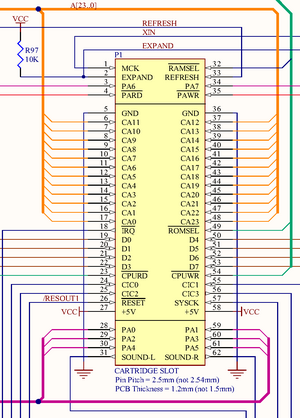Cartridge Slot: Difference between revisions
(worded better) |
(see also) |
||
| (One intermediate revision by the same user not shown) | |||
| Line 7: | Line 7: | ||
Most cartridges only have the middle 46 pins (the ones in-between the two black horizontal line segments in the above schematic). The remaining 16 pins tend to only exist on cartridges that contain [[enhancement chip]]s. | Most cartridges only have the middle 46 pins (the ones in-between the two black horizontal line segments in the above schematic). The remaining 16 pins tend to only exist on cartridges that contain [[enhancement chip]]s. | ||
=== | === See Also === | ||
* [[Address Bus A]] | |||
* [[Address Bus B]] | |||
* [[CPU Data Bus]] | |||
=== Reference === | |||
* https://problemkaputt.de/fullsnes.htm#snescartridgeslotpinouts | * https://problemkaputt.de/fullsnes.htm#snescartridgeslotpinouts | ||
[[Category:SNES Hardware]] | [[Category:SNES Hardware]] | ||
Latest revision as of 17:11, 21 August 2024

The Cartridge Slot is located on the top of the console, where a Game Pak is inserted. At the bottom of the cartridge slot is the Game Pak (GPK) Connector, which has 62 pin pads. The knobs of the opposite end of the Eject Button lever are also at the slot's bottom; they push the Game Pak out of the connector when the button is pressed (at least on the Super Nintendo, not sure about Super Famicom).
The Super Nintendo has small plastic tabs in the cartridge slot to prevent Super Famicom games from being inserted. These can be destroyed to allow Super Famicom games to fit into the cartridge slot and play.
Most cartridges only have the middle 46 pins (the ones in-between the two black horizontal line segments in the above schematic). The remaining 16 pins tend to only exist on cartridges that contain enhancement chips.

